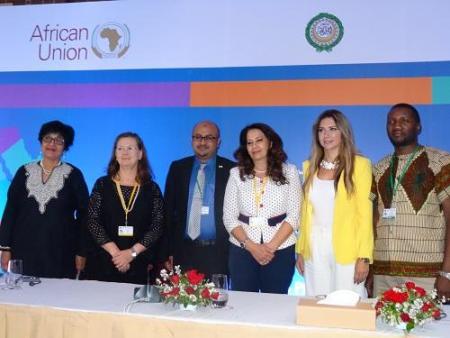
Panelists: (left to right) Dr. Jean D’Çunha, UN Women; Kirsi Madi, UNISDR; Amjad Saleem, IFRC; Adalah alAtiry, Palestine; Iman Rafii, Lebanon; Dr Richard Asaba Bagonza, Uganda.
By Denis McClean
TUNIS, October 12, 2018 - Women often suffer greatly in disaster situations but are also first-line responders, a debate on the eve of International Day for Disaster Reduction, was told today by an expert from UN Women.
More needs to be done to protect women’s rights in disasters and to enable them to make a greater contribution to disaster risk management, said Dr. Jean D’Çunha, of UN WOMEN Arab States, at the Africa-Arab States Platform on Disaster Risk Reduction.
Women are often small scale farmers or in poor paying jobs in agriculture and forestry with little bargaining power. Climate change and disasters were enhancing their vulnerability and leaving them open to abuse and sexual exploitation.
“Women are often the sole providers for the family and succumb to the worst forms of labour. Men have the option of migration after a disaster but women are left behind and if remittances do not come, life becomes very precarious,” Dr. D’Çunha said.
She cited Sierra Leone and Jordan as good examples of countries which take account of gender parity and inclusion in their policies on disaster management, promoting the fact that women are not just victims but can play a much bigger role.
In Morocco, the Ministry of Agriculture is training women as natural resource managers. In Yemen, thousands of women are engaged in water conservation.
Dr Richard Asaba Bagonza, Gender and DRR Researcher at Makerere University, Uganda, recalled that, worldwide, gender inequality meant that women and children are 14 times more likely to die in disaster events and comprise 75% of those displaced by disasters.
He said his extensive research in Uganda was likely applicable to other parts of east Africa.